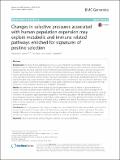Changes in selective pressures associated with human population expansion may explain metabolic and immune related pathways enriched for signatures of positive selection
Abstract
Background: The study of local adaptation processes is a very important research topic in the field of population genomics. There is a particular interest in the study of human populations because they underwent a process of rapid spatial expansion and faced important environmental changes that translated into changes in selective pressures.New mutations may have been selected for in the new environment and previously existing genetic variants may have become detrimental. Immune related genes may have been released from the selective pressure exerted by pathogens in the ancestral environment and new variants may have been positively selected due to pathogens present in the newly colonized habitat. Also, variants that had a selective advantage in past environments may have become deleterious in the modern world due to external stimuli including climatic, dietary and behavioral changes, which could explain the high prevalence of some polygenic diseases such as diabetes and obesity. Results: We perform an enrichment analysis to identify gene sets enriched for signals of positive selection in humans. We used two genome scan methods, XPCLR and iHS to detect selection using a dense coverage of SNP markers combined with two gene set enrichment approaches. We identified immune related gene sets that could be involved in the protection against pathogens especially in the African population. We also identified the glycolysis & gluconeogenesis gene set, related to metabolism, which supports the thrifty genotype hypothesis invoked to explain the current high prevalence of diseases such as diabetes and obesity. Extending our analysis to the gene level, we found signals for 23 candidate genes linked to metabolic syndrome, 13 of which are new candidates for positive selection. Conclusions: Our study provides a list of genes and gene sets associated with immunity and metabolic syndrome that are enriched for signals of positive selection in three human populations (Europeans, Africans and Asians). Our results highlight differences in the relative importance of pathogens as drivers of local adaptation indifferent continents and provide new insights into the evolution and high incidence of metabolic syndrome in modern human populations.
Citation
Vatsiou , A , Bazin , E & Gaggiotti , O E 2016 , ' Changes in selective pressures associated with human population expansion may explain metabolic and immune related pathways enriched for signatures of positive selection ' , BMC Genomics , vol. 17 , 504 . https://doi.org/10.1186/s12864-016-2783-2
Publication
BMC Genomics
Status
Peer reviewed
ISSN
1471-2164Type
Journal article
Description
This work was supported by the Marie - Curie Initial Training Network INTERCROSSING (European Commission FP7). OEG was further supported by the MASTS pooling initiative (The Marine Alliance for Science and Technology for Scotland)Collections
Items in the St Andrews Research Repository are protected by copyright, with all rights reserved, unless otherwise indicated.

